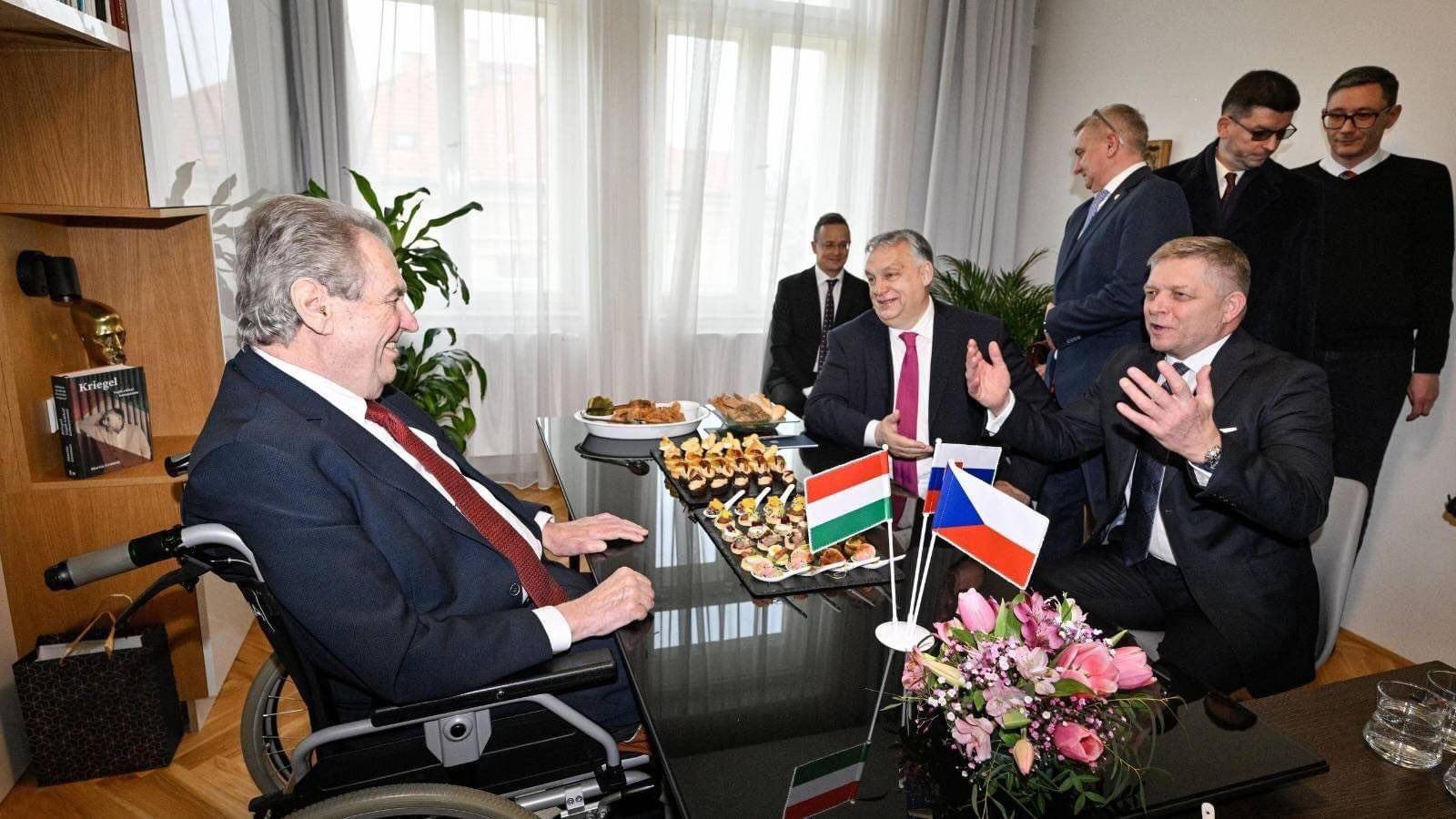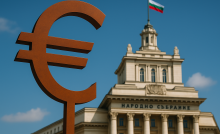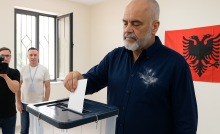V4 leaders agree on energy, immigration, but Russia remains elephant in room


The prime ministers of the Visegrad Four (V4) countries met in Prague, Czechia, for the first time in eight months, on Tuesday, 27 February.
Created back in 1991, the V4 comprises around 65mn EU citizens, but for the last two years differences of opinion about Russia’s invasion of Ukraine have been an existential threat for the grouping.
While Czechia and Poland back more arms deliveries to Ukraine, Hungary and Slovakia oppose this, and are calling for peace talks with Russia. Hungary in particular has dragged its feet over Russia sanctions, Ukraine’s EU integration and sending aid.
Czech PM pulled rank before agreeing to meeting
Czech Prime Minister Petr Fiala, currently the holder of the annual V4 presidency, had said last month that the group’s premiers could only convene if Hungary withdrew its veto of the EU’s aid package for Ukraine, as it did on February 1, and ratified Sweden’s NATO accession, which it did the day before the summit.
Hungarian Prime Minister Viktor Orban acknowledged that the V4 summit had not been “one of the easiest ones” and whether the group should be maintained in its current form had been discussed. The war in Ukraine has “overwritten everything”, he said.
“Today’s meeting convinced me that Visegrad is alive and important. We are able to respectfully acknowledge our differences even if we debate each other’s stances. We continue to strengthen cooperation in joint issues. Hungary is ready to do that,” Orban said.
PMs agree Russian invasion illegal, Ukraine needs support
Arguably the EU’s most pro-Kremlin premiers, Orban and Slovak Prime Minister Robert Fico were able to agree with Fiala and Polish Prime Minister Donald Tusk, that Russia’s attack on Ukraine had been a “gross violation of international law”, and that the war-torn country needs aid. The Polish, Czech and Slovak leaders also called for continued cooperation within the V4 framework.
Fico said Slovakia “will give all aid needed to Ukraine, except for weapons and ammunition”. All four premiers agreed that their countries are not considering sending troops to Ukraine. Fiala and Tusk said their countries would continue to provide weapons and ammunition to the war-torn country.
Tusk, Fiala meeting lasts longer than V4’s
Fiala tweeted “In a joint effort to strengthen European security, I discussed with (Tusk) today the possibilities of cooperation in the field of defence, the situation in Ukraine, migration, energy security and further development of the EU.
“I am glad that Poland remains our strong ally and friend. We completely agree on the situation in Ukraine and are strongly prepared to support Ukraine and find other ways to increase support. Ukraine is fighting against Russian aggression for security in Europe, not just for its sovereignty. The safety of our citizens is a priority, as is the development of good Czech-Polish relations. Thank you Donald Tusk for a productive and friendly dialogue,” Fiala added.
For his part, Tusk tweeted “it is good to have allies in Europe like the Czechs”. Tusk said the West should never compromise on core issues such as independence and territorial integrity.
The bilateral meeting between Fiala and Tusk before the summit tellingly lasted longer than the tense summit itself. Fiala found agreement on the position that Russia’s aggression breaks international law and Ukraine needs help. Another point of agreement was that none of the leaders are prepared to send soldiers to fight in Ukraine, an idea floated by French President Emmanuel Macron on Monday.
Fiala said the V4 leaders had also agreed on energy, notably the need for more nuclear power, as well as rejecting mandatory EU immigrant quotas and a “federal” union without national vetoes.
The EU’s Green Deal, aimed at carbon neutrality in the EU by 2050, should not impact farmers’ competitiveness, the leaders added. Tusk is meanwhile under pressure to keep onside Poland’s farmers who are currently blocking Ukrainian farm produce from entering Poland at the border.
Orban, Fico meet Czechia’s pro-Russian ex-head-of-state
Orban also met former Czech presidents Milos Zeman, Czech president from from 2013-23, and Vaclav Klaus, Czech head-of-state from 2003-13, on the sidelines of the summit. Fico also attended the meeting with the pro-Russian ex-president Zeman.
On Ukraine, Orban and Fico said it and Russia will be in the same place in two years, only tens of thousands more will be dead. The V4 has “meaning and future” despite differences of opinion on Ukraine, according to Orban.
Hungarian Foreign Minister Peter Szijjarto said “Many were probably expecting the disintegration of the bloc”, but the V4 will work on “preserving our sovereignty and in designing our own energy mix, as well as in preserving our competitiveness by setting our own tax rates”.
Recent Posts
Bulgaria’s euro debate intensifies as pro-EU opposition pushes January adoption date
Bulgaria’s pro-European opposition has tabled a declaration committing the country to join the Eurozone on…
Romania powers up its largest EV hub to support EU Green Deal transport targets
In a new step in the cleaner transport transition, OMV Petrom has inaugurated Romania's largest…
Ukraine arrests pair for spying for Hungary
The Security Service of Ukraine (SBU) has arrested two Ukrainian military veterans in Zakarpattia, west…
Hungary pays neighbours to avoid blackouts: lessons from Spain’s recent energy crisis
Hungary currently leads the world for share of solar energy in its energy mix, as…
Rama set to retain power in Albania election
Albanian Prime Minister Edi Rama has claimed victory in Albania’s parliamentary election on Sunday, 11…
Bosnia’s EU accession requires pro-EU coalition – high representative
The EU can formally begin accession negotiations with Bosnia and Herzegovina (BiH) when a stable…


